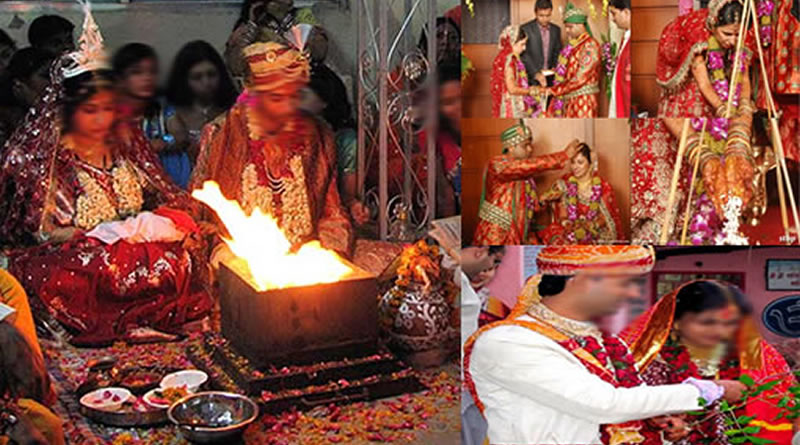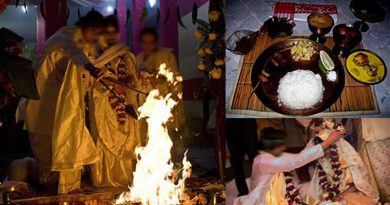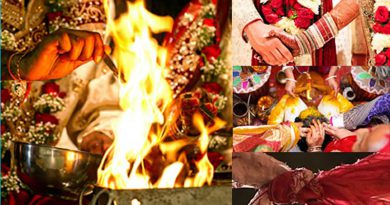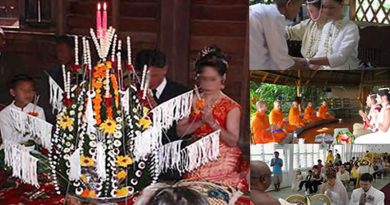Marwari wedding and its traditional customs and rituals!
Marwari wedding firmly adhere to the ancient customs and traditions. There are a number of pre weddings, wedding and post wedding customs or rituals, which are observed.
GahoiMumbai.com is delighted to provide an insight to these Marwari Wedding traditions…
Marwari wedding is celebrated with fun. It is an extravagant affair and extends over a period of days. Marwari wedding firmly adhere to the ancient customs and traditions. There are a number of pre weddings, wedding and post wedding customs or rituals, which are observed. After the completion of all these rituals, the wedding is believed complete. Actually, Marwari marriages are very traditional and rather royal in look and appeal.
Generally, Marwari weddings are celebrated with pomp and splendour. With all the ornaments and lavish clothes, the Marwari weddings are an extravagant affair. Marwari wedding rituals are an integral part of the Marriage and are done in a traditional way. The diverse Marwari wedding rituals can be divided as Marwari pre wedding ritual, Marwari wedding rituals and Marwari post wedding rituals.
Pre Wedding Rituals in Marwari Wedding:
A pre wedding ritual – Sagai:
The engagement ritual or the “Sagai” takes place at the house of the groom. This is strictly all male affairs. On this auspicious day, the bride’s brother puts “tilak” on the groom’s forehead. A sword, clothes, sweets etc. are given to the groom. “Ganapati Sthapna” and “Grih Shanti” is the performed a few days prior to the marriage, this is important as all ceremonies begin only after this ritual.
A pre wedding ritual – Pithi Dastoor:
The Pithi Dastoor ritual follows which involves the bride/groom and continues until the day of the marriage. The actual ritual consists of application of turmeric and sandal wood paste to the bride/ groom who cannot leave the house after this.
The bride dresses in an orange Rajasthani dress and is then brought under a silken canopy, which is held up with swords at four corners by four ladies who must belong to the same clan as the bride. She is brought to the ladies gathering, who then apply the paste to her.
A pre wedding ritual – Mahira Dastoor:
In ‘Mahira Dastoor’ the maternal side of both the bride and groom bring gifts for them.
A pre-wedding ritual – Mehfils:
Mehfils are an integral part of every Rajasthani marriage. It is usually held in the evenings, they are again arranged separately as the `ladies mehfil` and the `gents mehfil`.
In stunning dresses, they perform the ghoomar (a special dance done in a group). The bride at the mehfil is given a key position to sit and watch the proceedings. If the ladies` mehfil is in progress at the groom`s house, then only the groom is advantaged to attend the all-women affair. Of course, the men have their own mehfil, where singers perform and these are strictly all male parties.
A pre wedding ritual – Janev:
In the Janev ritual, the holy thread is given to the would-be groom on the eve of his becoming a house-holder. The groom has to be dressed in saffron robes like an ascetic and perform a havan before wearing the thread.
A pre wedding ritual – Palla Dastoor:
On the day of the marriage, or maybe a day prior to it, the Palla Dastoor which consists of clothes, jewellery and gifts from the groom and which the bride has to wear during the marriage ceremony is brought in by a few of the groom`s relatives to the bride`s house.
Wedding Rituals and Traditions in Marwari Wedding:
The wedding day ritual – Baraat:
A baraat consists entirely of male members but nowadays ladies are also become part of this. The bridegroom is typically dressed in a gold and orange traditional dress of achkan, turban and a churidar and jootis. All members, including the groom who rides an elephant or a horse, carry swords.
The wedding day ritual – Aarti:
As soon as the wedding ceremony begins the groom is taken inside to the ladies section where he is received by the bride`s mother with the traditional aarti, and then taken to the mandap to perform the wedding rituals. The bridegroom has to be accompanied only by a male member of the family, either a married relative or his younger brother or a younger male cousin.
The bride must keep her face covered throughout the wedding ceremony.
Post Wedding Rituals in Marwari Wedding:
A Post Wedding Ritual – Bidai:
At the time of the bidai, a coconut is placed under the wheel of the car before the bride lifts her veil for the husband after the marriage. At this stage, the groom usually gives a piece of jewellery to his bride. At the time of bidaai the parents of the couple praise one another and milani is offered by the bride’s father.
A Post Wedding Ritual – Baad-Rukai:
Baad-Rukai by groom sisters takes place as the bride is welcomed with the Grihpravesh ceremony to the groom’s house.
A Post Wedding Ritual – Grihapravesh:
After the bride reaches the groom`s house Grihapravesh takes place. The bride still wears the veil while the puja and other rituals take place. A few games are played between the bride and the groom. Neem juhari is played by the bride and groom with the groom’s family members.
A Post Wedding Ritual – Pagelagni:
The day following the grihapravesh, the pagelagni takes place. This is a ceremony where the bride, still in veil, is formally introduced to all the family members of the groom who bless her and give her gifts. The veil is then finally removed.
Special Features of Marwari Wedding:
Marwari wedding customs costs a fortune. Expensive clothes and jewellery are for the bride because it is a symbol of the wealth of the groom. The maternal side of both the bride and the groom also spend a lot of money while performing the numerous ceremonies.
If you need any help regarding Marwari Wedding ceremony or Marwari Wedding Management, please leave your message about your dates, ideas and budget plans at our Wedding Help Centre.
All this information is free and only for informational purpose.




